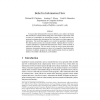Free Online Productivity Tools
i2Speak
i2Symbol
i2OCR
iTex2Img
iWeb2Print
iWeb2Shot
i2Type
iPdf2Split
iPdf2Merge
i2Bopomofo
i2Arabic
i2Style
i2Image
i2PDF
iLatex2Rtf
Sci2ools
113
click to vote
CSFW
2005
IEEE
2005
IEEE
Belief in Information Flow
To reason about information flow based on beliefs, a new model is developed that describes how attacker beliefs change due to the attacker’s observation of the execution of a probabilistic (or deterministic) program. The model enables compositional reasoning about information flow from attacks involving sequences of interactions. The model also supports a new metric for quantitative information flow that measures accuracy of an attacker’s beliefs. Applying this new metric reveals the inadequacies of traditional information flow metrics, which are based on reduction of uncertainty. The new metric can also be used to reason about misinformation; deterministic programs are shown to be incapable of producing misinformation. In addition, programs in which nondeterministic choices are made by insiders, who collude with attackers, can be handled.
Attacker Beliefs | Attacker’s Observation | Attacks Involving Sequences | CSFW 2005 | Security Privacy |
Related Content
| Added | 24 Jun 2010 |
| Updated | 24 Jun 2010 |
| Type | Conference |
| Year | 2005 |
| Where | CSFW |
| Authors | Michael R. Clarkson, Andrew C. Myers, Fred B. Schneider |
Comments (0)

